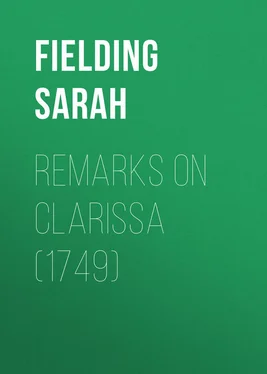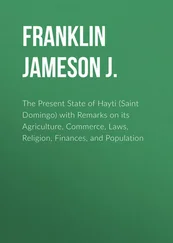Sarah Fielding - Remarks on Clarissa (1749)
Здесь есть возможность читать онлайн «Sarah Fielding - Remarks on Clarissa (1749)» — ознакомительный отрывок электронной книги совершенно бесплатно, а после прочтения отрывка купить полную версию. В некоторых случаях можно слушать аудио, скачать через торрент в формате fb2 и присутствует краткое содержание. Жанр: foreign_antique, foreign_prose, на английском языке. Описание произведения, (предисловие) а так же отзывы посетителей доступны на портале библиотеки ЛибКат.
- Название:Remarks on Clarissa (1749)
- Автор:
- Жанр:
- Год:неизвестен
- ISBN:нет данных
- Рейтинг книги:3 / 5. Голосов: 1
-
Избранное:Добавить в избранное
- Отзывы:
-
Ваша оценка:
- 60
- 1
- 2
- 3
- 4
- 5
Remarks on Clarissa (1749): краткое содержание, описание и аннотация
Предлагаем к чтению аннотацию, описание, краткое содержание или предисловие (зависит от того, что написал сам автор книги «Remarks on Clarissa (1749)»). Если вы не нашли необходимую информацию о книге — напишите в комментариях, мы постараемся отыскать её.
Remarks on Clarissa (1749) — читать онлайн ознакомительный отрывок
Ниже представлен текст книги, разбитый по страницам. Система сохранения места последней прочитанной страницы, позволяет с удобством читать онлайн бесплатно книгу «Remarks on Clarissa (1749)», без необходимости каждый раз заново искать на чём Вы остановились. Поставьте закладку, и сможете в любой момент перейти на страницу, на которой закончили чтение.
Интервал:
Закладка:
Life's but a walking Shadow, a poor Player,
That struts and frets his Hour upon the Stage
And then is heard no more,
perhaps gives us as strong an Image as it is possible to receive, of all the great Transactions perform'd by Mankind for these 6000 Years; and yet the celebrated Author, who wrote those Words, has diversify'd and display'd that strutting and fretting in as many various Lights as he has drawn Characters throughout his immortal Writings.
"In these two Volumes of Clarissa , it plainly appears, the Author's Intention is to impress deeply on the Reader's Mind, the peculiar Character of each Person in that Family whence his Heroine is derived; and in this I think he has succeeded so well, that for my own part I am as intimately acquainted with all the Harlows , as if I had known them from my Infancy; and if I was to receive a Letter from any one of them, I am sure I should not want the Name to assist me in assigning it to the proper Person. Tho', upon the whole, I don't know but there may be some Exuberances that might have been spared, as they stop the Progress of the Story, and keep us in anxious doubt concerning Clarissa's Fate, altho' the scattered Observations have generally the Recommendation of Novelty to amuse the Curious, Depth to engage the Attention of the Considerate, and Sprightliness to entertain the Lively; and Story is considered by the Author, as he says in his Preface, but as the Vehicle to convey the more necessary Instruction. And Clarissa says to Miss How ;
You will always have me give you minute Descriptions, nor suffer me to pass by the Air and Manner in which Things are spoken, that are to be taken notice of; rightly observing, that Air and Manner often express more than the accompanying Words.
"If this Observation is just, and Air and Manner can be placed before a Reader's View by writing, I am sure minute Descriptions are necessary; and I could point out several Places in Clarissa , where we may see the very Look of the Eyes, and Turn of the Countenance of the Persons mentioned, and hear the Tone of the Voice of the Person speaking."
The next Objection was raised by Mr. Dobson , to Mrs. Harlowe's Character, which he said, "It was plain you did not intend as a bad one, by her Meekness, Submission to her Husband, and her hitherto truly maternal Care of her Family; and yet, when she joins with violent overbearing Spirits, to oppress and persecute such a Daughter as Clarissa , because she steadily adhered to a Resolution of refusing solemnly to vow at the Altar Love and Obedience to such a Wretch as Solmes , what was this but Tameness and Folly instead of Meekness?"
Totally to justify Mrs. Harlowe was not attempted; on the contrary, it was unanimously agreed, that she was to blame: But Miss Gibson desired "Mrs. Harlow's Faults might not be thrown on the Author, unless it could be proved that he himself intended her Conduct should deserve no Censure. However, (continued she) to preserve any Charity in censuring her, I think it should be considered, how much a Woman must be embarassed, who has for many Years accustomed herself to obey the very Looks of another, where a Point is peremptorily insisted on, which, to comply with, must gall her to the Heart. Mrs. Harlowe might indeed have suffered with Clarissa , but could not have preserved her from her Father's Fury, irritated and inflamed by her ambitious violent Brother: And perhaps she flatter'd herself, that she might gain more Influence by seeming to comply, than if she had attempted absolutely to resist the Storm gathering in her Family. And this I think, the many Hints she gives, that if she was left to herself, it would be otherwise, is a full Proof of."
A young Lady, who had hitherto been silent, looked pleased at Miss Gibson's Remarks, and said;
"I think Clarissa herself has made very good Observations on her Mamma's Meekness, and the Effects of it, in one of her Letters to Miss Howe , where she says – In my Mamma's Case, your Observation is verifyed, that those who will bear much, shall have much to bear. And how true is her farther Observation, where she says, that she fears her Mamma has lost that very Peace which she has sacrificed so much to obtain."
"Your Remark, Madam, said Miss Gibson , is very just, and from this Character of Mrs. Harlowe , we may draw a noble and most useful Moral; for as in the Body, too rich Blood occasions many Diseases, so in the Mind, the very Virtues themselves, if not carefully watched, may produce very hurtful Maladies. Meekness therefore, and a long Habit of Submission, is often accompanied by a want of Resolution, even where Resolution is commendable. To be all Softness, Gentleness and Meekness, and at the same time to be steadily fixed in every Point 'tis improper to give up, is peculiar to Clarissa herself, and a Disposition of Mind judiciously reserved by the Author for his Heroine alone."
An old Gentleman who sat in the Corner, and often made wry Faces at the sudden Attack of Rheumatick Pains, with which he was often afflicted, objected strongly to Mr. Harlowe's arbitrary Usage of such a Wife, as being very unnatural. "Nay, Sir, (said Miss Gibson ) I think Clarissa gives a very good Account of Mr. Harlowe's Behaviour, in a Letter to her Friend, when she says;
But my Father was soured by the cruel Distemper I have named, which seized him all at once, in the very prime of Life, in so violent a Manner, as to take from the most active Mind, as HIS was, all Power of Activity, and that in all Appearance for Life. – It imprison'd, as I may say, his lively Spirits in himself and turned the Edge of them against his own Peace, his extraordinary Prosperity adding but to his Impatiency.
"And methinks, it is very easy to imagine, Mr. Harlowe's Pains, and Mrs. Harlowe's tender Concern for these Pains increasing together: her Attention to him, and earnest Endeavours to soften and alleviate the Extremity of his Torments becoming all her Care; till, his Ill-temper daily growing stronger by the Force of his bodily Disorders, he at last habituated himself to vent it on the Person who most patiently submitted, tho' her Heart was most nearly touched and affected by it. And I appeal to the common Experience of any Persons who have accustomed themselves to make Observations on the Scenes before them, if they have not often seen heart-breaking Harshness burst forth on those who strongest feel the Strokes, and yet submit to them without complaining; and this practised even by Persons who would take it much amiss to be thought peculiarly ill-natured."
The old Gentleman, without answering Miss Gibson , insisted on what he had said before; and then turning to his Daughter, in a rough Voice, accompanied with a fierce Look, bid her not sit so idly, but ring the Bell, that the Servant might get a Coach, for he would go home. The young Lady, who was as submissive a Daughter as Mrs. Harlow was a Wife, immediately obeyed his Commands, tho' it might be read in her Countenance, that she could have wished that he would have injoined them in a milder Manner; on which her Father observed, that the Girl was always out of Humour and sullen when she was employed. Indeed, Sir, said the young Lady, I love to be honoured with your Commands; I was only afraid you was angry with me. A Tear stole without her Consent from her Eyes, and at the same Time she looked at her Father with a supplicating, instead of a sullen Countenance.
As soon as the Coach came, the old Gentleman, with great Roughness, commanded his Daughter to attend him, and left us; and we could not help remarking, how much the Gentleman's Behaviour had added Weight to the Force of his Criticism.
Читать дальшеИнтервал:
Закладка:
Похожие книги на «Remarks on Clarissa (1749)»
Представляем Вашему вниманию похожие книги на «Remarks on Clarissa (1749)» списком для выбора. Мы отобрали схожую по названию и смыслу литературу в надежде предоставить читателям больше вариантов отыскать новые, интересные, ещё непрочитанные произведения.
Обсуждение, отзывы о книге «Remarks on Clarissa (1749)» и просто собственные мнения читателей. Оставьте ваши комментарии, напишите, что Вы думаете о произведении, его смысле или главных героях. Укажите что конкретно понравилось, а что нет, и почему Вы так считаете.












